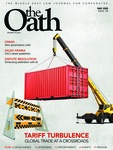New Lex Mundi GC Summit Report highlights harnessing the potential of GenAI

The Lex Mundi GC Summit Report 2024 titled “Opening Pandora’s Box: Early Implications of Generative AI for Corporate Legal Management” (‘the Report’) has been released. It is derived from discussions and findings from this year’s General Counsel Summit in Milan. It offers an in-depth analysis of the risks and opportunities associated with the adoption of Generative Artificial Intelligence (GenAI) in products, services, and operations, as well as in private practice law firms and in-house legal teams. The report draws upon insight from the Summit, which was attended by 50 General Counsel, from leading multinational businesses, and explored the impact of new technologies on risk management & compliance, the practice of legal services, and legal operations.
Generative AI has opened Pandora’s Box, ushering in an era of unprecedented disruption to the practice, delivery, and operations of legal services – according to this year’s edition of Lex Mundi’s annual General Counsel Summit Report. General Counsel must find a way to help their companies harness the potential GenAI whilst maintaining the “guardrails” of good governance, ethics, and compliance.
The Lex Mundi GC Summit Report 2024 titled “Opening Pandora’s Box: Early Implications of Generative AI for Corporate Legal Management” (‘the Report’) builds on findings from Lex Mundi’s 2019 report and predicts that the emergence of GenAI will disrupt the delivery of legal services more than previous technological shifts. The report finds:
1. Cross-Border risks and regulation: The rapid advancement of GenAI technology outpaces the development of regulatory frameworks, particularly in cross-border contexts. As one GC explains, this means “from a legal perspective, you have to rely on local lawyers to provide you with the correct advice in the jurisdictions where your company has operations.” This will allow General Counsel to go beyond mere compliance with local laws and proactively address emerging issues such as algorithmic bias, IP infringements, and antitrust complications, rather than waiting for regulatory mandates.
2. M&A and ESG compliance: The role AI plays in assisting with due diligence and document drafting in M&A deals is well established, yet it will be vital to understand how AI systems have been in use in an acquired business to avoid potential issues such as ownership disputes over AI-generated assets, liability for violations of data privacy and IP rights, and
3. Currently, as a General Counsel put it, “it is like the Wizard of Oz: you can’t see behind the curtain.” Meanwhile, the use of GenAI by regulatory authorities to monitor company activities means that market participants may be at greater risk of enforcement action. The GCs present at the summit acknowledged that in today’s geopolitical environment, “navigating sanctions without GenAI would be very difficult.” On the topic of ESG, the summit explored innovative uses of the public blockchain to achieve better product traceability and to comply with new supply chain transparency and reporting obligations that are entering into force in the EU and elsewhere.
4. Legal operations: The report identifies GenAI as being the technological step-change that may finally force the long-prophesized demise of the billable hour for corporate legal advice. GenAI’s ability adds significant capability to assist in drafting legal documents and other routine tasks, leading to significant time savings. Consequently, General Counsel are expecting cost reductions and efficiency gains to be reflected in legal fees. However, in the near term, the cost of advice may increase as legal counsel spend time addressing greater risk complexity and regulatory uncertainty. Over time, as in-house teams become more efficient with GenAI, the need to outsource work to private practices is expected to decrease, potentially adding to the consolidation pressures in the legal market. While GenAI reduces time spent on routine tasks, its limitations mean that human lawyers are still needed for strategic advice and to verify GenAI outputs. Value-based billing for strategic advice will increasingly fill the void.
As the Report elucidates, General Counsel are at the forefront of balancing the innovative potential of GenAI with the necessity for stringent ethical controls and robust risk management frameworks.
Eric Staal, vice president (Global Markets) at Lex Mundi, “Corporate legal heads find themselves navigating the gap between rapidly evolving GenAI capabilities and the race for competitive advantage on the one hand – and the uncertainty of law and regulation on the other. In 2019, we noted how AI was going to shift the paradigm of analog-era regulatory compliance and five years later we are now witnessing this in action. Beyond just compliance, GenAI stands to shift the market for complex legal advice more so than previous tech disruptions. This year’s Summit has illuminated the main areas of legal risk posed by the use of GenAI in products, services, and operations. Navigating the legal risk of GenAI across diverse jurisdictions is now mission critical for corporate strategy, requiring General Counsel to develop local business insight and safeguard their companies from regulatory unpredictability.”
Helena Samaha, CEO and president of Lex Mundi, “The integration of GenAI into legal practice marks a pivotal shift in how law firms approach day-to-day operations and the nature of their engagement with clients.
“As in-house teams increasingly leverage these technologies, the volume and nature of work for external counsel may change dramatically. This evolution challenges private practices to redefine their value proposition, with a focus on strategic, value-added services. At Lex Mundi, thought leadership is at the heart of our mission, the product of the unrivalled quality and cohesion of our membership. As a consequence, we are at the forefront of this conversation, exploring how law firms can innovate and align with the changing needs of General Counsel and their organizations in this rapidly evolving landscape. Our role is not just to observe these shifts but to actively shape the future of legal services, ensuring they remain relevant, efficient, and in tune with the broader changes sweeping through the legal sector.”

























































































































